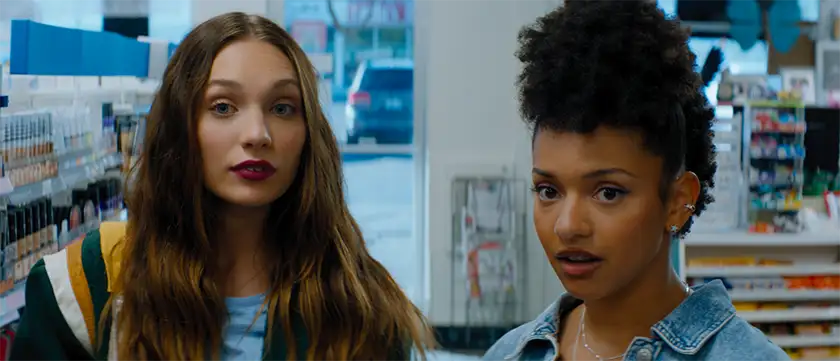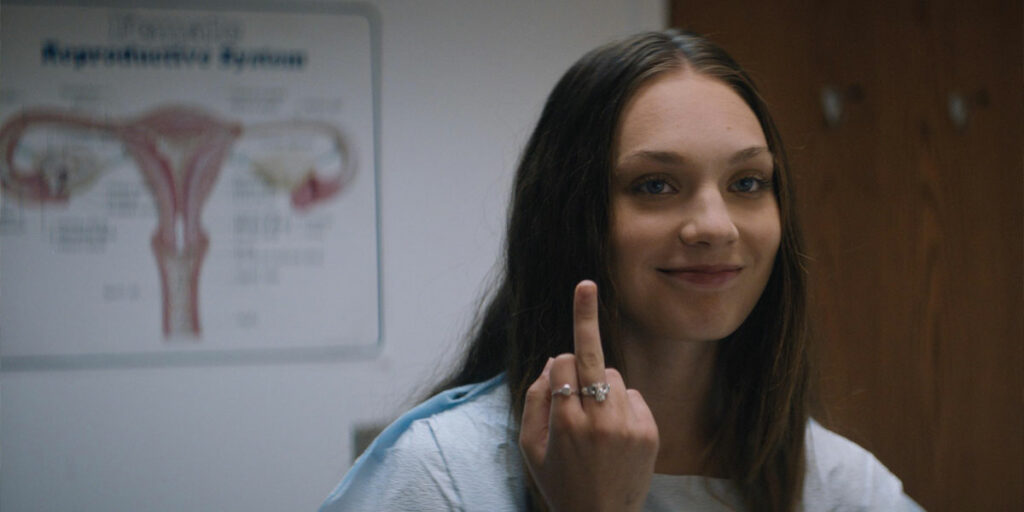Fitting In is a raw, unfiltered account of writer/director Molly McGlynn’s teenage troubles, nailed with heartfelt precision by Maddie Ziegler at the center.
I’ve been rooting for Maddie Ziegler for years, ever since I saw her in The Book of Henry (yes, I like that movie, leave me alone) and even further back in Sia’s music videos and the other Sia thing we don’t need to talk about. I see so much potential in her and have been waiting for her to break out as a big name. And between the acclaim she got for last year’s The Fallout and the acclaim she should get now for Fitting In (previously known as Bloody Hell), I’m hopeful that she’s on her way there. The same goes for writer/director Molly McGlynn, whom I’d never heard of before but whose career I’m going to make sure I follow after seeing this.
Fitting In (Bloody Hell) is not a nickname for Evil Dead Rise, which is also premiering at South by Southwest. It instead follows 16-year-old Lindy (Ziegler), who’s diagnosed with a reproductive condition known as MRKH syndrome, which results in a missing uterus and underdeveloped vagina. Naturally, this throws her sex life into an uproar, especially with her having been previously excited to lose her virginity to her boyfriend (D’Pharaoh Woon-A-Tai). The sexual frustration, methods of treating it, and hiding the news from her friends, all build within her to make an already-difficult teenage life … well, bloody hell. Also featured is Emily Hampshire as Lindy’s mother, who tries to lend her help despite a strained relationship between the two.
I couldn’t even begin to imagine what effect MRKH syndrome would have on someone, given that I have no female anatomy to speak of. But Bloody Hell paints such a raw, vivid, painfully unfiltered picture of the phenomenon and its impact on a person that it’s impossible to not imagine such a thing. And such clarity could have only been achieved because McGlynn herself has this condition, having made this film as a sort of autobiography. That authenticity comes across on the screen and is inescapable. The film and its characters mince absolutely no words and leave almost nothing to the imagination when it comes to portraying sexuality, pain, shame, confusion, and how all of them intersect.

Fitting In is uncomfortable, to put it lightly, for reasons that I can’t go into detail on without turning this website into an advertiser’s worst nightmare. That’s exactly how it’s supposed to be and it lets every single emotion be 100% felt and understood. But through all of that, McGlynn also finds the humor in such a difficult process. That seems to be the main theme with most films on offer at South by Southwest: bringing forth new points of view, presenting painful situations, and somehow finding a way to spin them into something funny, positive, and approachable. Many a cringe-filled laugh was had during Bloody Hell, but it’s carefully balanced with the soul and drama fueling it all.
Fitting In isn’t a particularly story-driven film, and its focus can jump around a bit. But for once, I actually consider that a positive because Lindy herself jumps around a bit. The emotions swirling within her send her into an increasingly troubling spiral as she makes reckless choice after reckless choice, becomes increasingly unsure of what she wants, and causes all of her relationships to constantly go back and forth. All the film does is drop this bombshell on her and let the fallout play out in ways that are all thoroughly understandable. Even the ending isn’t a perfectly-wrapped resolution. It’s simply where you leave the characters in this window into their lives, left to think about where they’ll go next.
None of that would hit as hard without Ziegler’s stellar performance at the center. You don’t need to be told any of the reasons why she does what she does. They’re all right there on her face and body language, whether subtly or explicitly. This is the third film I’ve seen Emily Hampshire in for this festival alone, and it’s easily her best performance. But the actor I really want to make sure isn’t overlooked is Ki Griffin, who plays a non-binary intersex person who befriends Lindy (and is of the same denomination in real life). Watch out for them, because their sincerity and unique voice add so much to the film. The performances are so good that they don’t even feel like performances. It feels like you’re somehow being let in on real conversations.
McGlynn and her cinematographer Nina Djacic bathe Fitting In in a slew of deep reds, from the lighting to the backgrounds, helping to visually sell Lindy’s swirling rage and confusion. And also because … y’know, Bloody Hell. Certain scenes with particularly claustrophobic shots and Casey Manierka-Quaile’s low, droning score could potentially be mistaken for a horror film out of context. Yet that color scheme also works both ways during more heartwarming scenes.
Fitting In isn’t just one subset of emotions on display. It’s a complex portrayal of a complex situation from someone who’s gone through it. And, of course, it’s informative. I’d never heard of MRKH syndrome before this film, and I doubt most people have either. I also didn’t know that Hitler’s wife possibly had it, which I guess gives a silver lining to the condition existing: ensuring Hitler never had children.
Fitting In isn’t the easiest of films to sit through, and at a glance, it may not be the most accessible or engaging to many. But through its complete lack of filters, pained honesty, and heartfelt representations of underseen people, it breaks down any barriers you might think it has. I love that McGlynn was able to take something so difficult and get something so positive out of it, both through her art and seemingly in her own life. This is why we need storytellers from every background imaginable. If they have the talent, they can bring us something amazing.
Fitting In premiered at SXSW 2023, with the title Bloody Hell, on March 13-16, 2023, and had its Canadian premiere at TIFF in September. The film was released by Blue Fox Entertainment and is now available to watch on digital and on demand.

